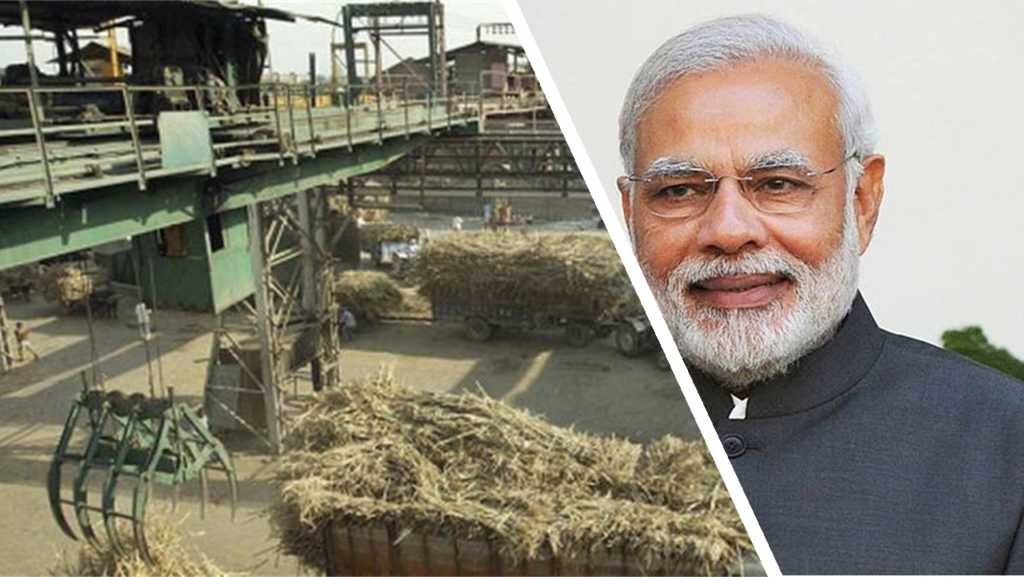The PM Modi government is killing two birds with one stone. In its National Biofuel Policy 2018, the government is trying to solve the issue of sugarcane farmer’s excessive produce. The new policy will also solve the fossil fuel import problem of the country. India is one of the largest oil and natural gas importers in the world, with most of the supply coming from gulf countries like United Arab Emirates, Qatar, and Saudi Arabia etc. In a season when farmers have good produce, price crashes to a new low due to excessive supply, the reason for this being limited availability of warehousing and transportation facilities in the country. Now with excessive produce going to ethanol refineries farmers do not have to sell their produce at throw-away prices. The biofuel, which is derived immediately from living matter unlike fossil fuel which is produced by geological process, will solve the problem for farmers as well as the oil import related issues.
The government is also expanding the base resource beyond sugar molasses, and according to the new policy, sugar-containing crops like beet, sorghum, corn and cassava, and damaged grains unfit for human consumption, such as rotten potato, wheat and broken rice would also be considered for ethanol production. The government has also put aside Rs. 5000 crore for establishing second generation refineries.
Second generation refineries will also solve the problem of agricultural residues because they can be processed into bio-fuel. Furthermore, burning of agricultural residues in states like Haryana, Punjab causes smoke related problems in Delhi where people have to wear masks during the winters due to severe smog. The increased capacity in biofuel production will lead to a cleaner environment in the country, since we are facing dangerous levels of air pollution. India, the biggest emitter of greenhouse gases after the US and China, plans to reduce its carbon footprint by 33-35% from its 2005 levels by 2030, as part of its commitments to the United Nations Framework Convention on Climate Change adopted by 195 countries in Paris in 2015. According to the policy statement by the government, “ethanol production for blending with fuel in 2017-18 will be around 150 crore liters, resulting in foreign exchange savings of up to Rs 4,000 crore. Each liter of biofuel is expected to cut down carbon dioxide emissions by 20,000 tons.”
The policy will also lead to infrastructural investment in rural areas, and according to estimates a 100 klpd bio refinery will require around Rs.800 crores capital investments. Many refineries will be set up so along with huge capital investment there will huge employment generation because one 100 klpd 2G bio refinery can contribute approximately 1200 jobs in Plant Operations. Besides that a lot of people will be employed in supply chain management and there will be many village level businesses thanks to this. Since thousands of farmers commit suicide every year, this policy will be helpful in solving rural distress. It will also help the PM Modi led government to double farmer’s income as promised by the Prime Minister.
The decision to create biofuels from excessive farmers’ produce will help India in maintaining its foreign exchange reserves as well. According to estimates, the country spends $300 million daily on oil and natural gas imports. With more biofuel produce, fossil fuel imports will have take up a lesser share of the government’s money. India has around $400 billion in foreign exchange reserves while China has around $3 trillion in foreign exchange reserves. India is trying to catch up with China in terms of Foreign Exchange reserves because more of it makes Net International investment position (NIIP) of the country stronger and is symbollic of the financial stability of the country.
This policy will help India in achieving its goal of self sufficiency in the field on energy and will save tax payers’ money spent on oil imports. The money could be used to provide public services like health and education in the country, as well as invest in poorer nations to solidify India’s diplomatic outreach much in the manner China does in Africa today.
